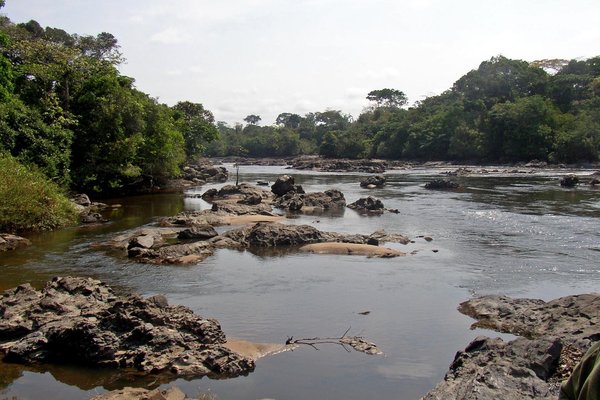Congo (Democratic Republic)
Okapi Wildlife Reserve
The Okapi Wildlife Reserve protects a rainforest that is home to about 5,000 of the estimated 30,000 okapi (forest giraffes) surviving in the wild.
The reserve lies in the Congo Basin and covers part of the Ituri rainforest. It has numerous species that are absent from surrounding areas. This includes endemic and threatened species of primates and birds, such as large numbers of chimpanzees and forest elephants.
Community Perspective: this site has been unreviewed so far.
Site Info
Official Information
- Full Name
- Okapi Wildlife Reserve (ID: 718)
- Country
- Congo (Democratic Republic)
- Status
-
Inscribed 1996
Site history
History of Okapi Wildlife Reserve
- 2007: Reinforced Monitoring
- 1997: In Danger
- impact of the war and civil conflicts in the Great Lakes region
- 1996: Inscribed
- Inscribed
- 1995: Referred
- Bureau - Fulfils Natural criteria but cultural values etc of indigenous pygmies not taken into account. Needs Management plan etc
- In Danger
- impact of the war and civil conflicts in the Great Lakes region Since 1997
- Type
- Natural
- Criteria
- x
Links
- UNESCO
- whc.unesco.org
- Official
-
- okapiconservation.org — Okapi Conservation Projec
- Related
-
- america.aljazeera.com — The struggle to save the ‘Congolese unicorn’
All Links
UNESCO.org
- whc.unesco.org — whc.unesco.org/
Official Website
- okapiconservation.org — Okapi Conservation Projec
Related Resources
- america.aljazeera.com — The struggle to save the ‘Congolese unicorn’
News Article
- Dec. 11, 2024 apnews.com — Chinese gold mining threatens a protected UN heritage site in Congo
- June 3, 2021 news.mongabay.com — Deforestation intensifies in northern DRC protected areas
- July 16, 2017 reuters.com — Gunmen attack Congo wildlife reserve, U.S. journalist, three guards missing
- Nov. 20, 2015 whc.unesco.org — UNESCO Director-General condemns the murder of a guard at Okapi Wildlife Reserve
- Dec. 1, 2013 zsl.org — Elusive okapi classified as 'Endangered'
- March 4, 2013 wildlifenews.co.uk — Okapi WHS loses 37% of elephants in 5 years
- June 26, 2012 okapiconservation.org — Guards killed at Okapi Wildlife Reserve on 24 June
Community Information
- Community Category
- Wildlife habitat: Fauna
Travel Information
One thousand visitors or fewer
DD : “The Reserve has a small guest house which receives a small but …
Red Zone Travel Advisory
DRC fully off-limits
Recent Connections
-
Protection of a single named species
Okapi: "Okapi Wildlife Reserve contains… -
Red Zone Travel Advisory
DRC fully off-limits -
One thousand visitors or fewer
DD : “The Reserve has a small guest hou…
Connections of Okapi Wildlife Reserve
- Geography
- Trivia
-
-
Total Solar Eclipse since Inscription
3 November, 2013
-
- Ecology
-
-
Elephants
African elephant (forest elephant) -
High-Biodiversity Wilderness Area
Congo Basin -
Bovines
Forest buffalo -
Rainforests
-
Over 100 mammal species
The Reserve contains 101 mammal species (Crit X OUV) -
Chimpanzee habitat
-
Strepsirrhini
dwarf bushbaby, potto -
Swamps and Marshes
"combined with swamp forests that grow alongside the waterways" (OUV) -
Inselbergs
"The inselbergs of the region are a unique habitat which harbor an endemic flora" -
Refugium
"As a Pleistocene refugium, the forest contains dense evergreen and semi-evergreen forests, dominated by Mbau trees (Gilbertiodendron dewevrei). The Nepoko, Ituri, and Epulu rivers flow through the reserve, surrounded by swamp forests. The granite outcrops in the north of the reserve protect critical habitat for Encephalartos ituriensis, a threatened species of cycad. Because of its relatively stable climate during the repeated ice ages, the wildlife reserve, and the Ituri Forest as a whole, protects a unique biological community." (Wiki)
-
- Damaged
-
-
Poaching
Forest elephants are under intense pressure from ivory poachers. Many players are involved including uncontrolled elements of the Congolese army (FARDC) and armed militia. Hunting for the commercial bushmeat trade is also intense, and has increased significantly since the rehabilitation of the national road RN4 was completed in 2008
-
- World Heritage Process
-
-
Inscribed on a single criterion only
x. to contain the most important and significant natural habitats for in-situ conservation of biological diversity, including those containing threatened species of outstanding universal value from the point of view of science or conservation.
-
- Human Activity
-
-
Pygmy Peoples
Some 4000 people live inside the reserve, mostly Mbuti pygmies." and " although not a factor in the criteria for natural sites, the OFR is of special interest for its cultural values as it is inhabited by traditional nomadic pygmy Mbuti and Efe hunters" (AB). -
Natural sites with indigenous human population
"The reserve is inhabited by traditional nomadic pygmy Mbuti and Efe hunters"
-
- WHS on Other Lists
- Timeline
-
-
Pliocene
"The end of the Pliocene epoch (2.5-6 million years ago) saw a number of long necked giraffids evolve, but largely unsuccessfully with only 2 surving to this day"
-
- Visiting conditions
-
-
One thousand visitors or fewer
DD : “The Reserve has a small guest house which receives a small but steady flow of visitors. The rehabilitated RN4 highway improved access for tourism.” (IUCN Outlook 2020) -
Red Zone Travel Advisory
DRC fully off-limits
-
- WHS Names
-
-
Protection of a single named species
Okapi: "Okapi Wildlife Reserve contains flora of outstanding diversity and provides refuge to numerous endemic and threatened species, including one-sixth of the existing Okapi population." (OUV)
-
News
- apnews.com 12/11/2024
- Chinese gold mining threatens a pr…
- news.mongabay.com 06/03/2021
- Deforestation intensifies in north…
- reuters.com 07/16/2017
- Gunmen attack Congo wildlife reser…
Recent Visitors
Reserved for members.
Community Reviews
No reviews yet. If you have visited, write one!
